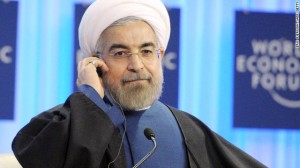 Iranian President�Hasan Rouhani�was greeted by the global elite last week in Davos, Switzerland, for his message of reconciliation with the West. But statements made by the Iranian leader and his top aides at the World Economic Forum rekindled concerns in Washington and Europe about his ability to deliver.
Iranian President�Hasan Rouhani�was greeted by the global elite last week in Davos, Switzerland, for his message of reconciliation with the West. But statements made by the Iranian leader and his top aides at the World Economic Forum rekindled concerns in Washington and Europe about his ability to deliver.Mr. Rouhani addressed the Davos conference Thursday morning in a widely anticipated speech and restated his commitment to forging a quick compromise with global powers over Iran�s nuclear pursuits. �Iran, in pursuing its nuclear energy program, has never sought nor seeks anything but peaceful applications of this technology,� he said.
But neither Mr. Rouhani, nor his foreign minister,�Javad Zarif, used their visit to the Swiss alpine village to convey a willingness to accept the substantial dismantling of Iran�s nuclear infrastructure that a final agreement with the U.S. and its diplomatic partners is going to entail. Negotiations are expected to begin within a month.
The Institute for Science and International Security, a Washington think tank that has advised the Obama administration, estimates Tehran will need to mothball or destroy 15,000 of its 20,000 centrifuge machines to guarantee it can�t rapidly �break out� and produce weapons-grade fuel.
Mr. Rouhani, however,�told CNN in Davos�that his government�wouldn�t accept deep reductions in its nuclear capabilities. �In the context of R&D and peaceful nuclear technology, we will not accept any limitations,� he said.
The Iranian leader and Mr. Zarif also offered few signals that Tehran will embrace a United Nations-backed initiative to end the civil war in Syria. Iran is the Syrian regime�s closest ally, and the Obama administration has hoped Mr. Rouhani will pressure Syrian President�Bashar al-Assad�to make concessions to end the fighting.
Mr. Zarif told a Davos roundtable that all �foreign elements� should withdraw from the fighting in Syria. But the U.S.-educated diplomat unsettled many diplomats and analysts at the conference by denying the Iranian government itself was deploying military officers to bolster the Damascus regime.
The Obama administration believes Iran�s elite Revolutionary Guards are deployed in Syria. And the U.S. says intelligence shows Iran mobilized�the�Lebanese military Hezbollah to send at least 5,000 fighters into Syria�to back Mr. Assad.
�We are not sending anyone� into Syria, Mr. Zarif said. �Hezbollah has made its own decisions.�
Many Iran analysts said the Rouhani delegation�s statements indicate the limited power it has inside Iran. Iran�s Supreme Leader�Ayatollah Ali Khamenei�is the ultimate arbiter on decisions involving the country�s nuclear program. And the Islamic Revolutionary Guard Corps, or IRGC, controls Iran�s Syria policy.
�I think the Iranians� comments reinforces the perception that Rouhani isn�t totally in control of his country�s national security,� said Oubai Shahbandar, a former U.S. Pentagon official who advises Syria�s opposition movement. �There is a divide between his words and actions.�
By The Wall Street Journal�
The Iran Project is not responsible for the content of quoted articles.










